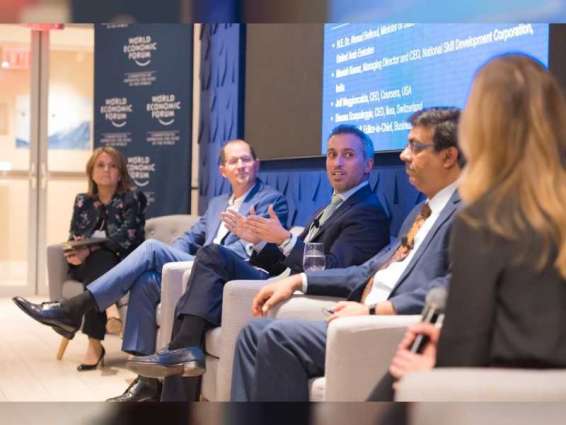NEW YORK, (Pakistan Point News - 13th Nov, 2019) Dr. Ahmad Humaid Belhoul Al Falasi, Minister of State for Higher Education and Advanced Skills, attended a global conference on the ‘Future of Work’ organised by the World Economic Forum, WEF, held in New York City on Tuesday and Wednesday.
Titled ‘The Future of Work: From Analysis to Impact’, the two-day event is hosted by WEF’s Centre for the New Economy and Society. It brings together various stakeholders, executives, and experts to explore insight and best practices to create a concrete plan of action, in an effort to drive the shift from analysis to impact on the future of work.
Al Falasi’s participation in the New York event comes just a few months after the UAE government signed on to join WEF’s Closing the Skills Gap 2020 Programme, at the Forum’s conference in Dalian, China, in July 2019. The programme seeks to steer efforts to upskill the workforce in the UAE and the region, and equip them with the skills they need to navigate the labour market in the Fourth Industrial Revolution era.
Taking part in a panel discussion titled ‘Reskilling, Upskilling and Redeployment at Scale:Public-Private Collaboration’, the UAE Minister outlined four key features of successful public-private collaborations, noting that they first need to be worker-centric, where workers are placed at the centre of the design, communication, and delivery of all programmes.
They need to be communicated with through consistent messaging, and public education campaigns must be leveraged to raise their awareness.
The second feature is effective governance, where industry leaders partner with local training institutes, with support from the government. All partners sit at one table with clearly defined roles and responsibilities to consolidate top-down efforts and collaborate with bottom-up initiatives.
He then addressed the issue of funding, exploring various sources, from multi-actor consortiums to Primary donors, before boarding the fourth and final feature, data, where he called for leveraging research to guide efforts, and use data as the common denominator in the collaboration.
Dr. Al Falasi noted that successful collaborations proactively addressed potential challenges by exploring four main elements: the challenges likely to arise upon signing; additional challenges likely to come up beyond the initial agreement; existing solutions for these early challenges; and the lessons to be learned from resolving these challenges.
He also took part in the event’s closing panel, titled ‘A Roadmap for Action’, where he described the skills gap as a global challenge, noting that the Fourth Industrial Revolution is radically transforming the future of jobs and changing the way entire sectors operate. He called for collaborative efforts to prepare human capital for the new workforce.
"It is a new era that pushes innovation and creativity into a direction that can boost overall human productivity," Al Falasi stated. "When artificial intelligence and technology are leveraged efficiently, they can free up our workforce from redundant work and allow more space for real talent to shine. This reality, coupled with our leadership’s extensive efforts to diversify our national economy as a bulwark against future challenges, made it imperative that we work to upskill our population, with a focus on advanced skills, in particular."
"The UAE has made investing in people its top priority – particularly the young – to help them develop the skills they need in the future," He added, noting that this approach led to the launch of the National Programme for Advanced Skills. The Minister then went on to highlight other ambitious initiatives in that direction, such as the Mohamed bin Zayed University for Artificial Intelligence, the world’s first graduate-level, research-based AI university, offering graduate degree programmes in Artificial Intelligence.
Dr. Al Falasi also shed light on the UAE Cabinet’s decision to appoint the UAE Fourth Industrial Revolution Ambassador in a world first.
The Minister concluded with recommendations for the path ahead, calling for a shift in the way we look at jobs and the economy. He outlined a list of game-changing developments that made such a shift necessary, including employees’ desire for more autonomy, flexibility, and ownership; a booming start-up scene offering jobseekers more options; and a shared economy model challenging traditional businesses.




